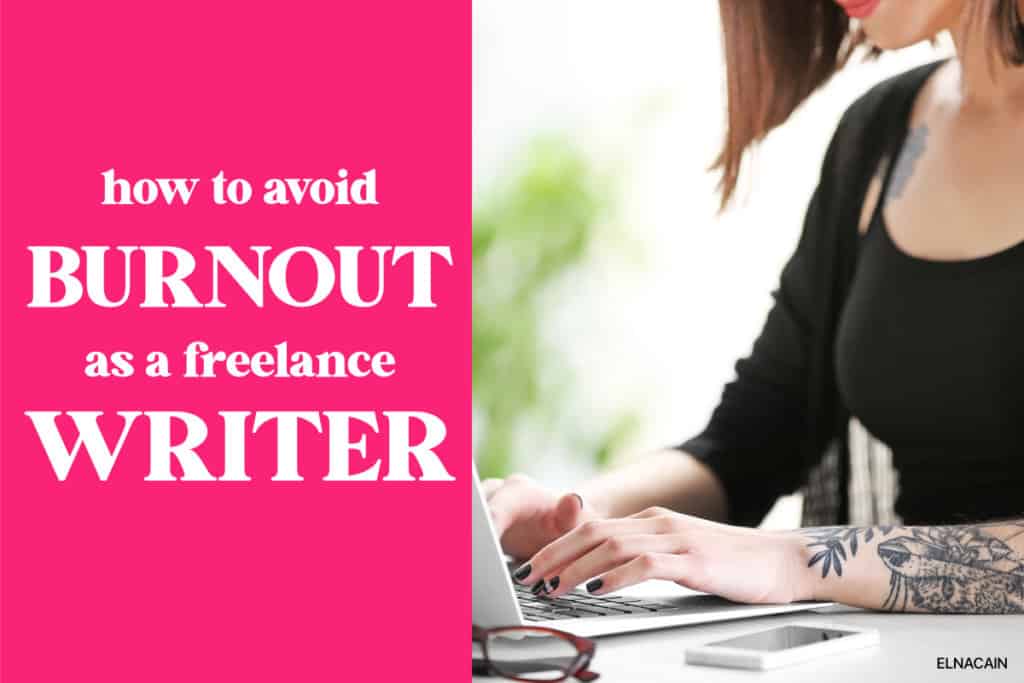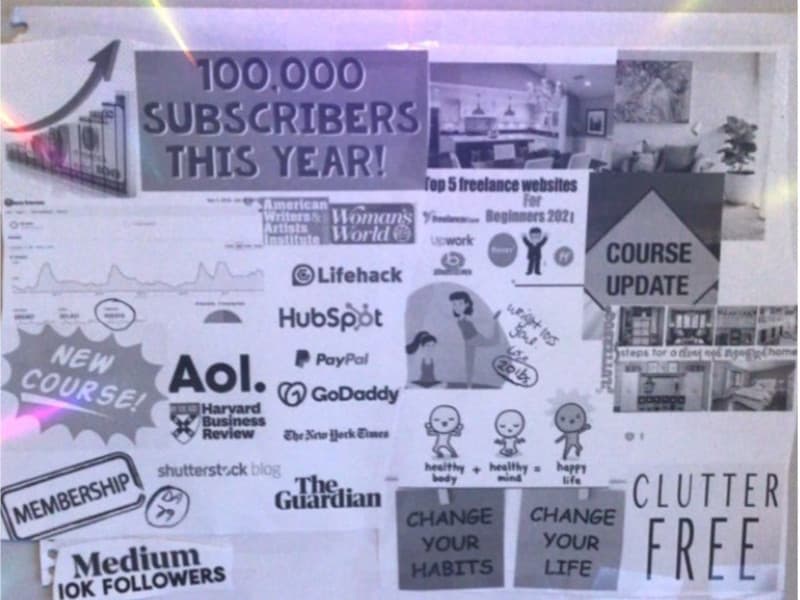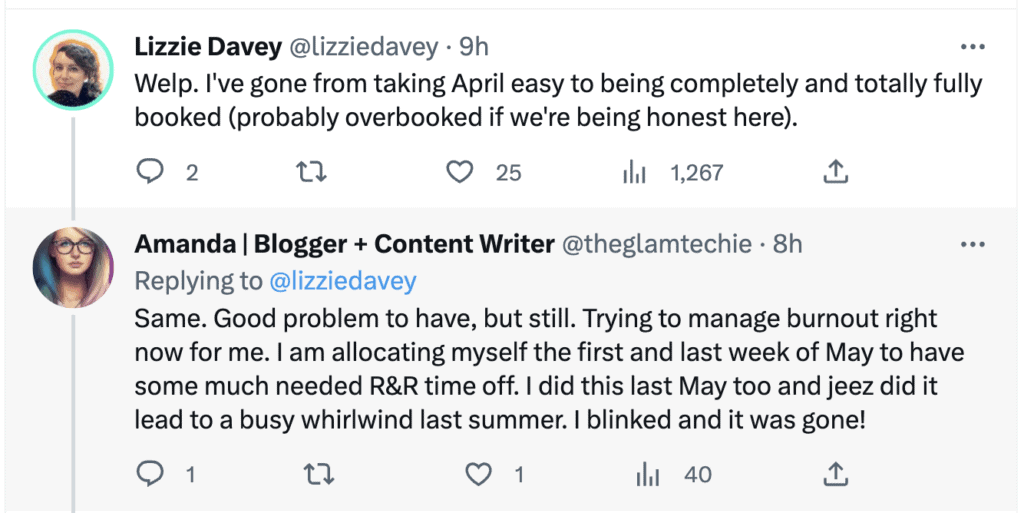Writing is a form of creativity, and as freelance writers, it’s our job to write compelling blog posts, white papers, case studies, or any content a client wants.
And because we write, this job can take a toll on us whether we like it or not.
I never understood this idea of: even though you have the TIME to do the work, you may not have the ENERGY to do it.

If I had the time to write and couldn’t, I just blamed it on my life or stress.
But, really, it’s because I haven’t got the energy to write creatively.
This has never been more true as I land bigger clients with bigger projects.
Not only do they want a writer, but also someone who knows SEO, knows copywriting, can interview SMEs, can illustrate points, and make the article easy to understand.
All that COGNITIVE LOAD drains me of my creativity.
That’s a tall order for a freelance writer. And before you know it: you are burnt out.
How do you avoid burnout as a freelance writer?
You want work-life balance and to be as productive in your day without losing your passion for writing.
If you want freelance writing to be your long-term success, you must protect your creativity, or your mental state and income might suffer.
To help you out, here are 11 ways to never burn out as a freelancer.
Because when you don’t write, you don’t get paid.
1. Listen to Your Creative Energy
Look –
Freelance writing is NOT all writing. It’s made up of:
- 45% writing (but 75% of that is researching)
- 20% finding and securing freelance writing jobs
- 20% managing your client work
- 15% professional growth (webinar trainings…)
Even though the act of writing makes up a small part in our business, it requires a large cognitive load. It’s like we are writing a term paper each time!
I know that when I write if I’m not in the flow, I tend to take more breaks.
Why? I use more energy for topics I’m unfamiliar with than with ones that I am.
When this happens I can’t write for 30 minutes at a time. Instead, I can only write for 10 minutes before I’m drained.
For example, a client asked me to write about AI, and I said sure.
I’ve been hearing a lot about generative AI and I’ve been using AI writing tools.
I thought – no problem.
Well, this post was about AI in cybersecurity, CRM, and AI in business.
I am not that familiar with these topics, so for this post, it took me more time than usual to write.
I was expending a lot of energy learning about the topic, finding experts, and researching it all.
And for me, if I don’t balance that creative energy with “easy” writing and “difficult” writing, I get stuck.
Freelance writer Kat Boogaard mentioned in one of her emails that she had difficulty writing that newsletter.
“Wednesday night, I snagged my laptop and tried to tap out some sentences on the couch—hoping that a change of scenery would get my creative juices flowing. But nope. I just couldn’t bring myself to string a few words together.”
She goes on to say that client work requires enormous energy, and no matter what grit she had, the writing wouldn’t be her best.
“Could I have grit my teeth and pushed my way through if I really wanted to? I guess I could have. But speaking from experience, that makes the process of creating something significantly more painful—and, despite the grit it took, the end result is still subpar. “
Instead, she listened to her creative energy and gave herself time to find that energy again.
This is what freelance writers MUST do to protect their creativity.
I know I can handle three clients wanting weekly content for client work.
I can’t handle more than that load since I have multiple sites to manage and write on, two email lists, and Youtube channels.
Knowing this, I am guarding my creativity and dolling it out when necessary.
But when I first started, this wasn’t the case.
When I had a workload increase and landed more freelance writing jobs, this immediately caused me to burn out and slow everything down.
This wasn’t productive and I lost positivity around my client work.
When this happened, I had to focus on one project at a time and eventually drop a client.
2. Create Boundaries
It’s important to give clear boundaries to your clients.
This is especially true when you are transitioning to freelancing full-time.
As you add more clients to your workload, you will feel the pull to work more per day and per week.
But, if you don’t set work hours and let your clients contact you at any time of the day or week, you will start to procrastinate and lose all motivation to write for your clients.
SEO content writer Ali Raza said it’s important to set boundaries with clients and have clear expectations about the job as a way to manage your work.
“It’s important to communicate your availability, preferred method of communication, and project timeline upfront to avoid last-minute rushes and stress.”
When I started freelance writing, I did NOT create boundaries with my clients.
If they emailed me on a Saturday afternoon, I responded.
If I received a Tweet from a client at 10 pm, I responded.
I was eager to “please” my clients and tell them, “Hey, you can count on me!”
Also, clients would ask me to rush-order content or make last-minute changes, and I would accept this as part of the job.
This caused me to burn out quickly.
I had to work on setting “business hours” and having weekends free, as ways to foster my creativity and well-being.
But this took time for me to realize. It’s not like I would wake up one morning and tell myself, “I need to create more balance in my day. I will only take client calls during the week and not work on the weekends.” And it happend!
I wish! Instead, I had to be intentional on Friday afternoons and avoid checking my email or social profiles until Monday morning.
Next, I worked on changing my work day from 9 am-6 pm to 9 am-3 pm.
I work only when my twins are in school.
And, now?
I look forward to Mondays and am excited about the weekend with my family.
3. Write During Your Golden Hour
Over the years, I’ve learned that the BEST time for me to write has changed.
When my twins were babies, I found the evening the perfect time to write.
I would spend time from 6-10 pm just writing away.
I had the energy and was thrilled and excited to get this freelance business going!
But, as my twins grew up and the more client work I had, my best time to write – my Golden Hour – changed from evening to morning.
My energy waned by the time dinner was on the table, and I needed to decompress in the evening.
The great thing is that your Golden Hour isn’t set and can change every season or year.
For example, copywriter Laura Timn is the most productive in the morning.
“I realised that I can’t do any creative writing in the afternoon. It has to be in the morning while my mind is still fresh.”
Look at your day and figure out the time you can most write without distractions.
4. Have an Abundance Mindset
We live in the hustle culture. Give me more gigs, more money, and more clout.
You’re made to be lazy if you aren’t grinding away 24-7.
I’m sorry, but I’m a mom first and a writer second.
I cannot live by this scarcity mindset of trying to get more clients and more money.
If you seem to be stuck in this grind and hustle mentality, I want you to really look at why you are doing this.
Is it fear of not being able to write full-time?
Is it confusion as to what you need to do to land work?
Whatever the emotion, recognize this and flip it around to have an abundance mindset.
For the first three years of my business, I was hustle, hustle.
I lived to pitch and work and write.
But, that grind totally burnt me out.
It wasn’t until I took a step back and focussed on the important things (my family, having happy clients, doing my work) that I could breathe and focus.
And, I found visualizing this abundant life (business and home) helped me achieve it faster.

5. Schedule Life
It’s hard when you work from home!
You start to become complacent in your day.
And, I don’t know about you, but when I’m “blah,” my day is “blah,” and I say, “What’s the point?”
This negativeness causes me to burn out.
Clarinda of Marketing Minamalists, started freelancing when COVID-19 hit and she had a hard time with managing her time and business.
“Finding work for myself wasn’t tough, but it required lots of willpower. Setting my own time, having nothing to get me up in the morning, and no deadlines to worry about did nothing for me and my business.”
As a new freelance writer, you might get the freelance bug and want to do freelancing ALL. THE. TIME.
I had the bug, and I worked on my freelancing all the time!
But, from experience, this isn’t what you should do.
I didn’t take a vacation until seven years into my business!
Please don’t do what I did!
Instead, do what finance writer Jessica Walrack says,
“Take time in nature away from screens. Also, regularly doing a physical activity, I enjoy-currently indoor climbing.”
This is scheduling life, and you gotta do it to avoid burnout at all costs!
6. Write In Your Wheelhouse
Remember the story I told you about how I had to write about AI in business?
Well, I try hard NOT to put myself in those writing positions that are outside my wheelhouse because I know what that does to me.
Over the years, I’ve narrowed down my niche and am only writing about certain topics I’m well familiar with.
I don’t get burnout when I write about “easy” topics.
I thrive!
And when you write these topics during your golden hour – ??
This is my secret to having a successful freelance writing business!
7. Write Creatively (Not In Your Writing Niche)
This is my #1 method to avoid burnout when I freelance write.
Hands down!
By taking breaks from writing about content marketing or social media marketing for B2B SaaS, I get excited when I write for clients.
This is part of the reason why I have many blogs and that I write on Medium.
If this isn’t for you, instead of writing creatively, why not BE creative instead?
Brand copywriter Julie Ahrens says,
“The more time I spend meeting my friends, going out, attending dance classes, drawing & writing cheesy poetry, the less I have to care about creating content. The ideas just kept flying in.”
I love the idea of filling your “cup” with other creative tasks.
I love to knit, bake and watch a comedy to destress and feel refreshed.
8. Stand Firm on Your Rate
 You’ll find that the clients that pay low rates are the clients that will cause the most stress and headaches.
You’ll find that the clients that pay low rates are the clients that will cause the most stress and headaches.
These clients don’t value you as the writer and only want to get a deal for their content.
It’s important as a freelance writer to stand firm on your rate. Decide on a range and stick to that.
When I started freelance writing, my rate range was $.10/word -$.15/word.
Now? My range is $.60/word – $.85/word.
With my range, I don’t automatically turn down work.
I see where they fit in my rate range and do my research to see what type of company this is and who their content lead and editor are.
You’ll also write less when you structure your freelance writing business this way.
The more money for each piece of content means you don’t have to work day and night writing 3,000 word blog posts 3x a week.
Instead, it’s 3,000 word blog posts 2x a month.
Less client work = less burnout.
9. Listen to Music as You Write
Music grounds me when I work.
It fills my mini breaks while I write or think about what I will write.
And I don’t only listen to coffee chatter or lofi either.
Right now, I”m listening to Katy Perry’s “Dark Horse.”
Upbeat music from popular singers sets the mood for me, and I can write over their singing!
But, in the beginning, it was modern classical music for me!
Try listening to music as you write, no matter what type of music it is.
Your mood will change, and you might tap into your writing flow, helping you avoid burnout.
10. Read a Fiction Book
This one of me is a hard one.
I love reading fiction, but I’ve only been reading fiction books to my twins for the last five years or so!
But I’m hoping to change that this year. I recently purchased The Invisible Life of Addie LaRue.
I’m unsure if I’ll enjoy it, but it’s something to try!
I also picked up Yearbook by Seth Rogan, and even though this isn’t fiction, it’s a book that will make me laugh and smile!
And what’s great about reading fiction is that it will help you become a better freelance writer!
“Still cranking away on this fiction piece in my free time, and I cannot express to you how much it’s helping me in my work-related writing. It stretches your vocabulary, makes you more thoughtful on phrasing, pushes you to write more visually…highly recommend.” – Kaleigh Moore
11. Take a Break
Look –
We do this to ourselves.
We fill our content schedule until we are fully booked, then put our nose to the grind and write.
This is the life of a freelance writer!

Solopreneur and coach Craig Cherlet says,
“I’ve been burned out several times. The secret is to stop and take a break. This is a sign that you need rest. Most likely brain rest. After rest take inventory of what you’re doing day-to-day. What’s causing stress? Eliminate stress and useless work & refocus on your goals.”
If you want to freelance write full-time, then you must take a break and not overbook yourself!
I try to incorporate creative breaks while I write.
I can write uninterrupted for around 30 minutes, and at that time, I unconsciously stop writing, get up and do something else like make lunch, put a load of dishes away, or just chat with my husband.
Doing something other than writing helps me continue to write at a top level for my next block of writing time.
It’s Time to Manage Burnout As a Freelance Writer
Remember to take time for yourself and to fill your creative cup.
If you don’t you will burn out.
Freelancer Corrie Oberdin knows all too well.
This is a big challenge, but honestly, I relax & rest because for a long time (say, 13 out of the first 15 years of my freelance career) I didn’t. And then I burnt out. Can’t work if you can’t get out of bed. So I relax and rest, knowing if I don’t, I’ll be worse off.
I can’t promise you that you won’t ever experience burnout again; you will!
But you can manage and work to avoid it when you feel it sneak back into your life.
As soon as I say “yes” to a client, I immediately get my outline out of the way and start sourcing examples and stats over the next few days.
Once I do all the “grunt” work for my article, I am less stressed out because what’s left is the easiest part – writing!
So, tell me in the comments what you do to avoid burnout or at least manage it so it’s not causing you to stress and think freelancing isn’t for you!
I’d love to hear them.




8 Comments